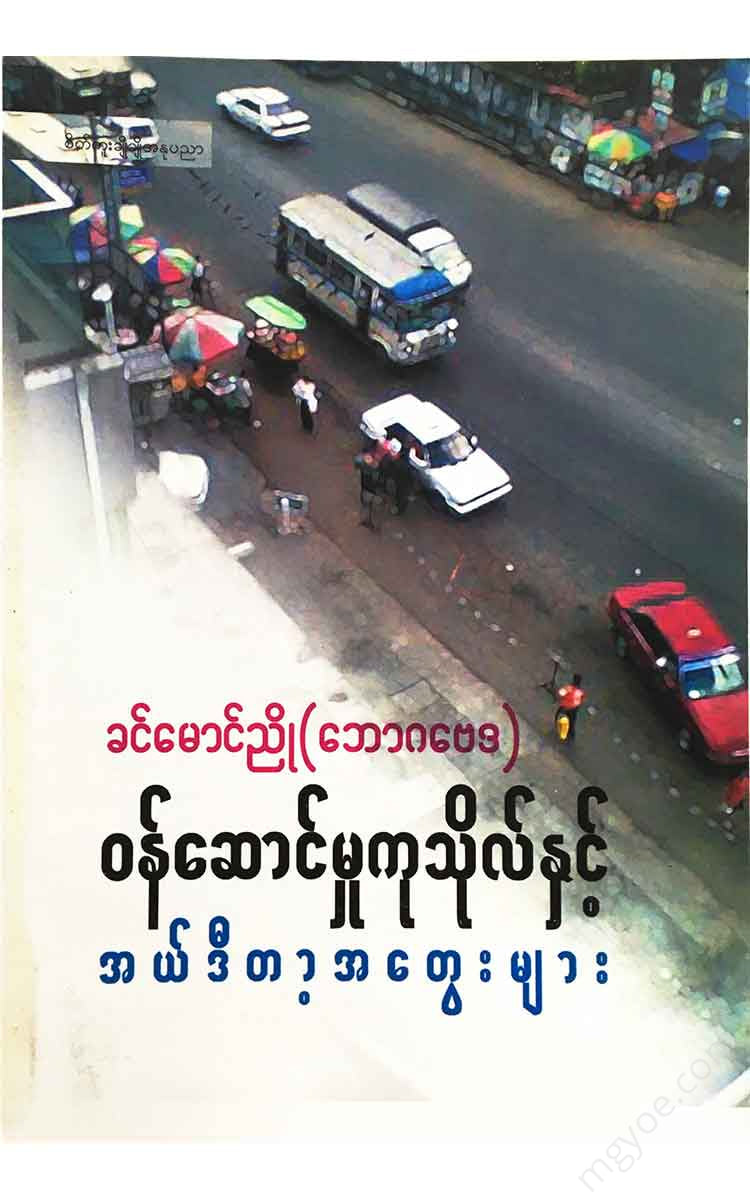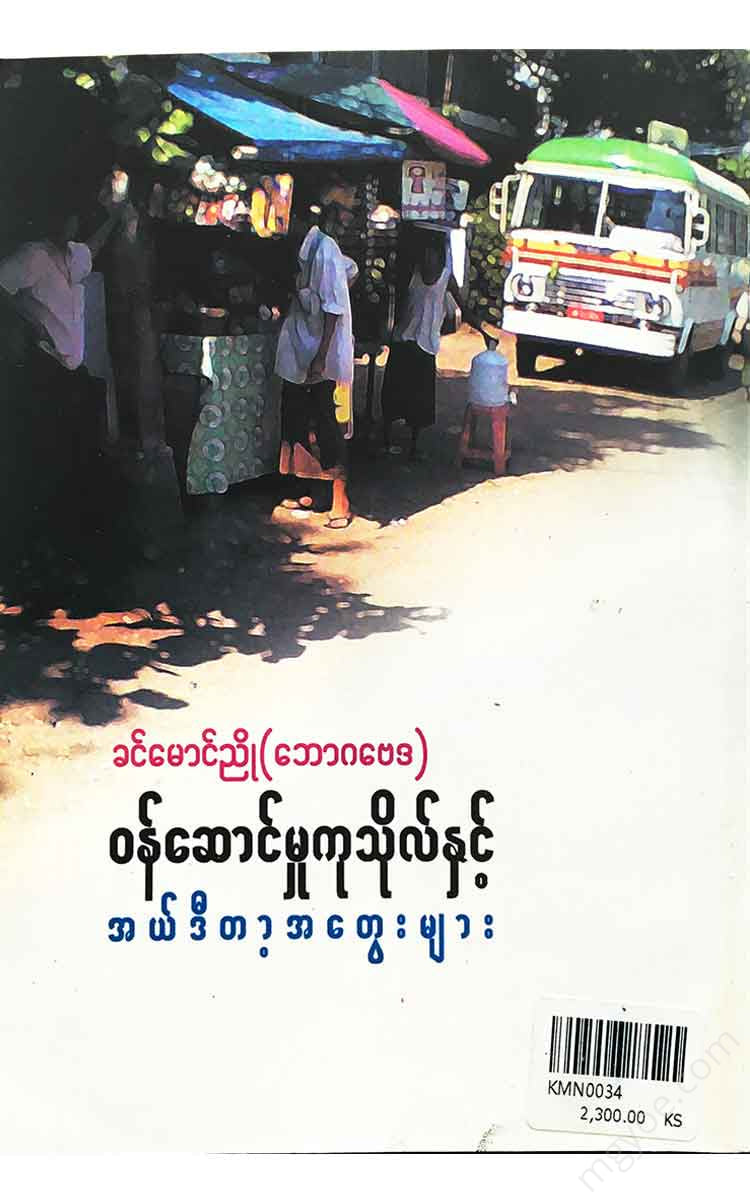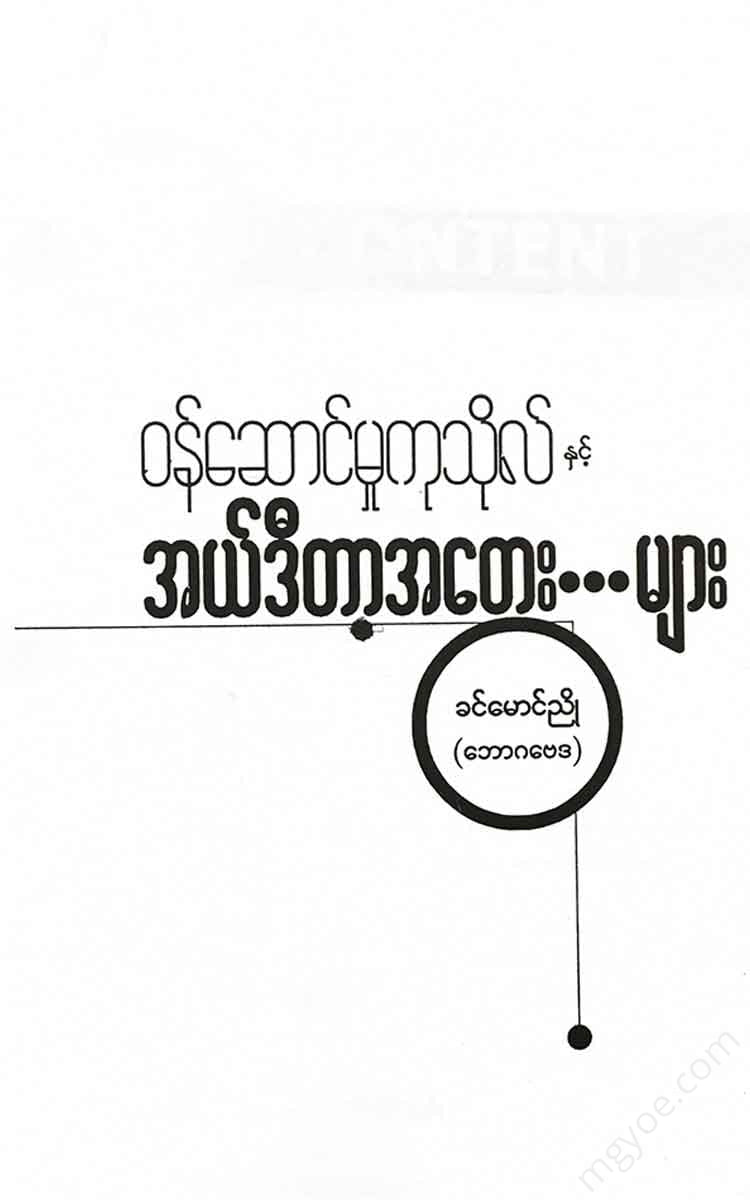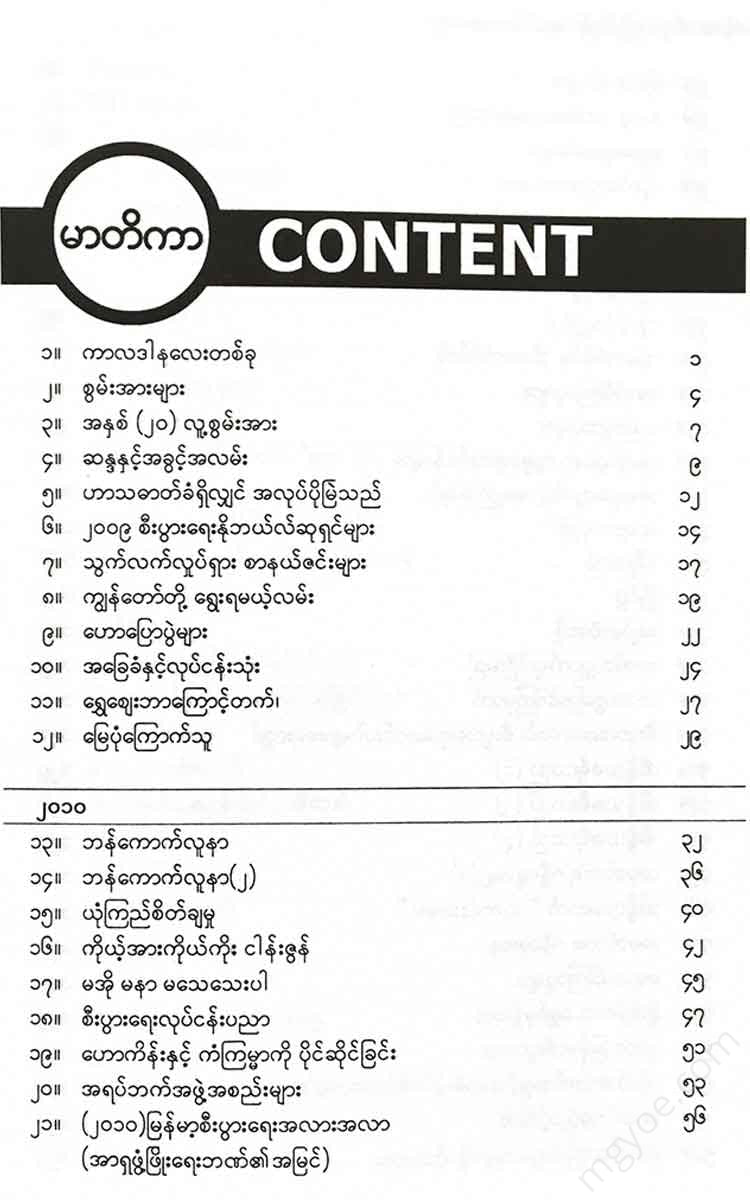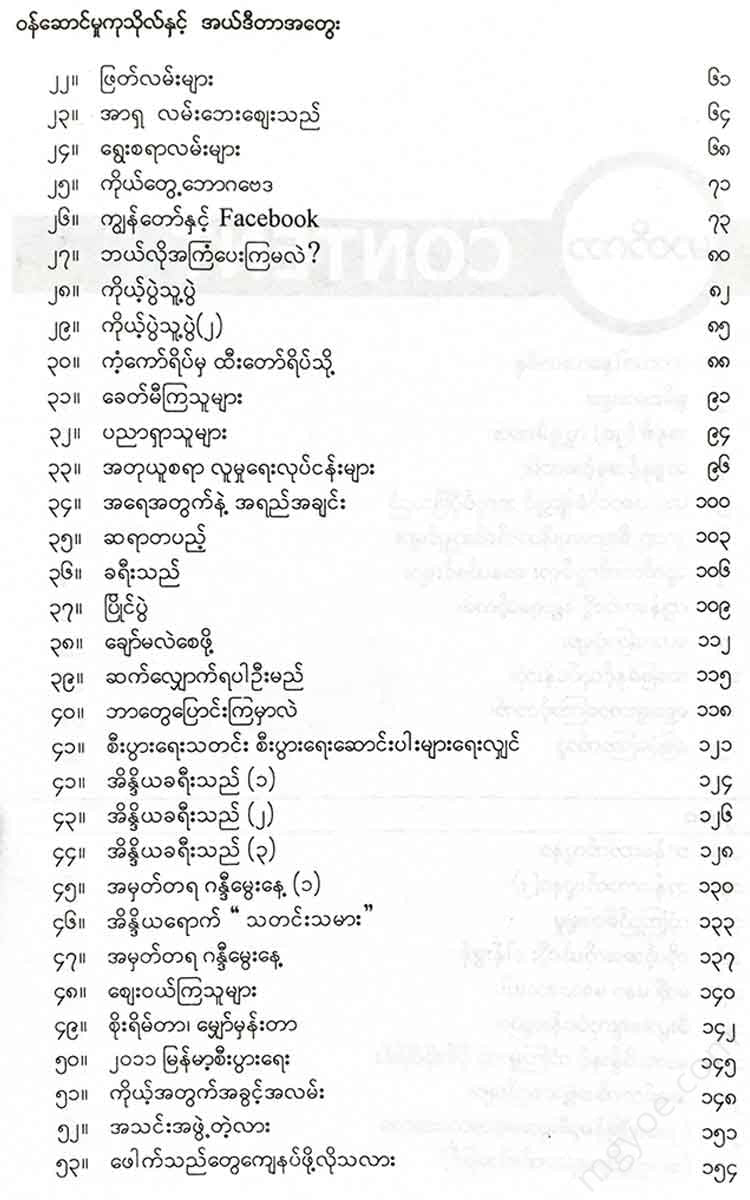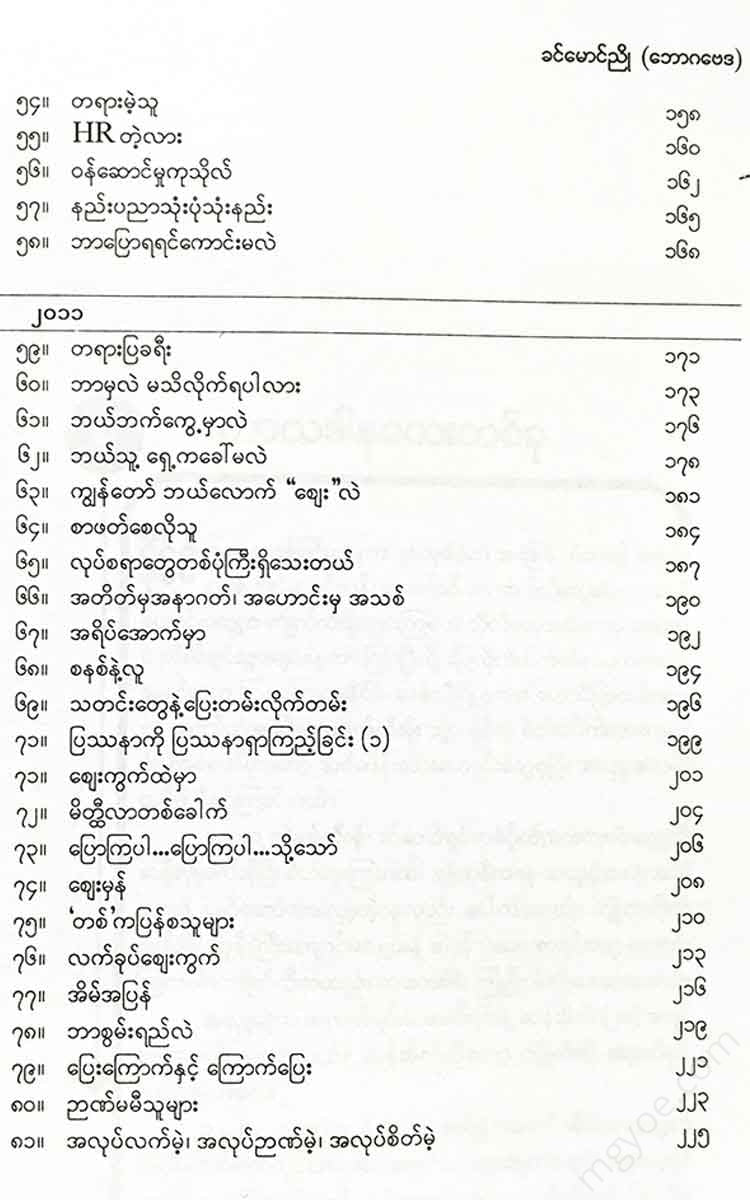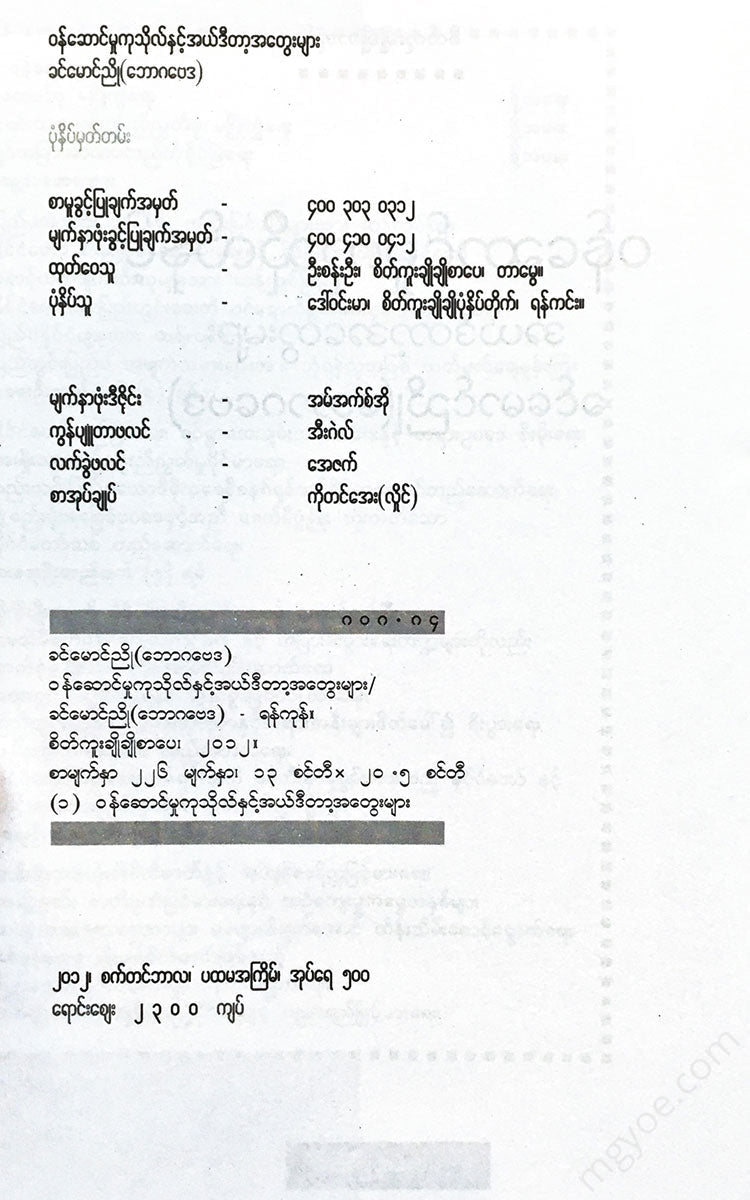စိတ်ကူးချိုချိုစာပေ
Khin Maung Nyo (Economics) - Service Merit and Editorial Thoughts
Khin Maung Nyo (Economics) - Service Merit and Editorial Thoughts
Couldn't load pickup availability
A small gift
I have been wanting to go to Kyaikthiyo for a long time, and I have been wondering if my friends and former students will go to Kyaikthiyo for the 17th week of the Basic Diplomatic Skills Course opened by the Ministry of Foreign Affairs. Yes. Last month, when I visited the Blue Mountains near Sydney, Australia, I got the idea of going to Kyaikthiyo. One day, the former students got together and planned to do a charity event.
Originally, they thought they would donate rice to the schools around Kyaik Htiyo San Taw Shin. Someone also came forward to donate a car to go from Yangon to Kim Moon Camp. They approached Kyaik Tho and asked for a list of monasteries and Waso monks. Kyaik Tho had already arranged a car.
The donations gradually grew to more than 20 bags of rice. We will only buy the bags of rice when we reach Kyaikto.
On 12. 9. 2009, I left home at 4:30 in the morning. The car and the drivers were very professional, and we drove to Theinzarat, crossing the new Sittaung Bridge. I had been there with a news team before the bridge was completed. We had breakfast at a restaurant in Theinzarat and then continued our journey to Kyaikto, where we were waiting for them. When we bought rice in Kyaikto, the wholesale and retail shops were unable to get the number of bags of rice we wanted. Then, an official sent us a rice mill to get the number we wanted. The distance between Yangon Market and Kyaikto Market meant that we had to add about 10 more bags of rice.
Then, they bought 12 items, from oil, onions, sugar, butter, toothpaste, and toothbrushes, worth more than 22 million won. The mountain bus fare, accommodation, and food were at their own expense. It was not the Buddhist festival season at this time, so there were only a few shops at the Kim Moon camp. Some shops were still being renovated. Having been a teacher and dormitory manager for about 30 years, my skills also showed in Kyaik Htee Yoe. A former student who had lived in the Khapaungsaung was the leader of the rotating group on the Kyaik Htee Yoe-Kyin Moon Camp Pyintaw bus line. He was the one who went on the return trip and earned merit.
We had lunch at the Kim Moon camp, left the car we had brought from Yangon, and climbed the mountain with bags of rice and supplies. A senior official who had lived in the southern part of Daw Na also came with us, but he was smiling at the steepness of the Kyaik Htei Yoe mountain hike.
When we arrived at Rathedaung, we slowly climbed up the side road of Rathedaung. When the car reached the communication tower, two giants attacked the school again. Since there were no workers or any kind of support, we carried the rice bags and other things ourselves, carefully loading them up the moss-covered stairs so that they wouldn’t slip. It used to cost about 2,500 won to carry a bag of rice from Kyaikthiyo Monastery to the school, but now, when food was running out, the monks were very happy that they had arrived in such a hurry.
At the foot of Kyaik Htiyo Mountain, you don't even have to carry your own belongings, relying on the workers at the construction site. The Kyaik Htiyo Temple, the clean and strong, is allowed to worship. The belongings are distributed at night. In the morning, they go to nearby schools and donate water. The abbot of Kyaik Htiyo School preaches the Samburi Sadhana Dhamma.
They are so happy that they have donated to 23 schools, where they need it, when they need it, and with all their hard work. This is the first time they have donated, so they will continue to donate in the future, and they will start collecting and expanding their donations, and they are sharing their faith.
Powers
Compared to the era I lived in, the youth of this era have very good fortune. They have opportunities that they never had before. To take advantage of these opportunities, you need to have “wisdom.” As fortune gives, those who are intelligent can take advantage of them, while those who are not intelligent will not be able to take advantage of them.
I remembered reading and hearing many sermons by Yo Sayadaw about human power, so I searched for his teachings again.
Now I am listening to the Dhamma of Yo Sayadaw, “You also get merit, you also get satisfaction.” If we expand on the well-known saying, “You also get merit, you also get satisfaction,” can there be any kind of work that does not bring merit, or that is not happy? It is also possible to get unmerited merit, but you also get satisfaction. It is also possible to do unmerited deeds that harm others and harm yourself. Therefore, it is best to do work that not only brings you merit, but also does merit, work that is meritorious, and work that can benefit both yourself and others.
20 years of human power
A Japanese friend referred me to a group of Japanese researchers. He wanted to know what changes had happened in the field of education, especially higher education, university education, in the past 20 years. What improvements had happened? Yeah, I hadn't even thought about it.
The first thing that comes to mind is the physical buildings. From a few dozen universities, there have been hundreds. There are universities all over the country. The University of Economics, which was originally only in Yangon, now has three in Monywa and Meiktila. Some sub-disciplines are also being offered in the degree program.
Master of Business Administration. Not only that. Master of Public Administration. In addition to full-time courses, part-time courses are also available. Some employees are more interested in part-time courses in the morning and evening than in full-time courses. Now, when hiring, you can see that you need to have an MBA or MPA.
Traditionally, only government employees were allowed to study abroad. Now, we see that civil society organizations and private individuals are also allowed to study abroad. Therefore, we see that the number of people who are allowed to pursue postgraduate studies abroad and work in private companies and organizations is increasing significantly.
I also noticed that universities where there were few foreign PhD graduates in the past are now producing local PhD graduates.
Since the introduction of the market economy in 1988, people have become more interested in accounting, marketing, and management, which were previously taught in classrooms. To meet this demand, human resource development departments have opened morning and evening courses and offered diploma courses. In addition to social studies, applied psychology, law, and economics, there has been a rapid increase in the study of English and other languages.
To meet the demand for education, not only government universities but also private courses have emerged. These courses include skills related to work, assistance in going abroad to work, computer-related courses, as well as courses that lead to studying at foreign universities to obtain diplomas issued by foreign countries. Lectures and seminars on courses that are aimed at studying abroad and training are always seen in the big cities of Yangon and Mandalay.
It should also be noted that training schools and job opportunities, journals and magazines that cover academic articles related to business have emerged. There are weekly lectures on computers, engineering, and business education in Yangon and Mandalay.
Overall, I believe that the education sector has grown rapidly over the past 20 years and is a broad-based economic sector, including the private sector, driven by market forces.
Desire and opportunity
While writing about human powers, I remember that Yo Sayadaw had given a lot of lectures on the power of charity, virtue, and meditation, and the power of the three jewels of virtue, concentration, and wisdom. I don't remember exactly. So I looked for Yo Sayadaw's books at home and couldn't find them. I couldn't find them in bookstores either. I also found other records in the roadside record shops, but I couldn't find what I wanted. Finally, when I went to a record shop, I found a record of the Sayadaw's I wanted that had about 300 songs and cost less than a thousand.
In the past, 300 sermons would have to be collected on 300 CDs and 300 records. And the collection would be completed on a single disc. As people's abilities increased, so did the material.
I thought that when I got to Hledan, I would meet many people and talk to them, but in reality, there were not many people to talk to. Today, I met three people, Mr. Myo Myat Thu from MRTV 4, and Mr. Htun Naung from the university. Mr. Htun Naung lives alone.
One day, I was walking with my friend and then I continued to the teacher's house. The whole street they were on was full of game shops. I had been there before, but I didn't even remember it.
In this era, there are no opportunities to study. If you say that there is no way to relieve boredom, then looking at the examples I have seen, there are many techniques for learning and things to use for entertainment. I think it is not good to do nothing and entertain yourself, but I have never seen anything like excessive study. If you have the will, I think that there are techniques and opportunities at your fingertips to replenish your energy, replenish your energy.
If you have a sense of humor, you'll work harder.
If you want to keep your job, keep it, and have a sense of humor. In an article in Success Magazine titled “Be Casual, Your Shirt Is Not Long Lasting,” Roger Ailes wrote, “The advice I give to some of the clients I meet with is to be casual.” It’s a cliché, but your workplace depends on how serious you are about being casual.”
According to one company that recruits executives, 7 out of 80 people quit their jobs. Not because they lack skills, but because of personality conflicts. As an executive, your promotion to middle and upper management positions is based more on your interpersonal skills and ability to get people to want to do their jobs than on your performance. Relationships with superiors and colleagues are also important. Historically, superiors have promoted people they like.
